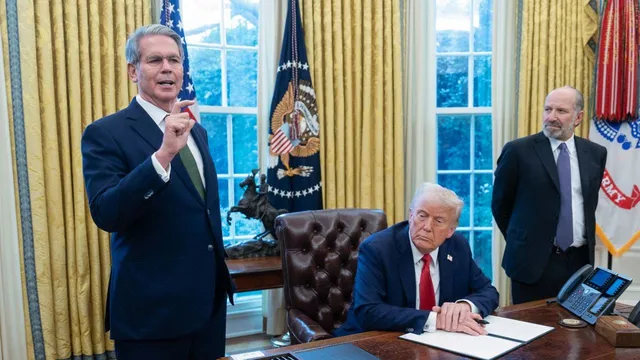
Trump's economic agenda aims to attract global investors
2025-05-05 16:09- Treasury Secretary Scott Bessent highlighted the core components of Trump's economic agenda, including tariffs and tax cuts.
- He mentioned ongoing trade negotiations with key partners, including China, indicating potential advancements.
- The administration aims to attract global investors and create a stronger economy through these policies.
Express your sentiment!
Insights
On May 5, 2025, in the United States, Treasury Secretary Scott Bessent presented President Donald Trump's economic agenda at the Milken Institute Global Conference, aimed at a gathering of international investors. Bessent emphasized three main components of the administration's strategy: tariffs, tax cuts, and deregulation, which he believes are essential to spur growth in the U.S. economy. He articulated that the administration has been focused on eliminating government waste and harmful regulations while fostering an environment for private investments through fresh tax legislation. During his speech, Bessent drew attention to Trump's initiatives to engage trading partners in negotiations, indicating that significant progress was being made, especially with China. He stated that there might be substantial advancements in these talks in the upcoming weeks, despite existing high tariffs on Chinese imports. This effort for renegotiation includes promises made by Trump, who claimed that the U.S. was close to securing numerous trade agreements that would be beneficial for the economy. In addition, Bessent noted that the administration's economic policies are designed to create a 'golden age economy' for the nation. He argued that the foundations laid by the Trump administration would enable American workers to achieve higher living standards and innovations across industries. The Treasury Secretary reinforced the need for a balanced approach that could foster both new innovations in technology and ensure support for traditional sectors like steelmaking, emphasizing the importance of opportunity for all workers. As the conference unfolded, Bessent reiterated the administration's ambitious deregulatory agenda which includes tax reforms aimed at supporting small businesses and revitalizing American industry. Trump’s previous tax legislation is a vital starting point, focusing on crucial incentives for investments, equipment expensing, and permanent small business deductions. According to Bessent, the policy direction aims to stimulate not only the manufacturing sector but also the energy industry, thus expanding the overall economic horizon for the United States.
Contexts
The Milken Institute Global Conference is a prominent event that brings together leaders from various sectors including finance, technology, and healthcare to discuss pressing global issues and innovative solutions. In 2025, this conference focused on critical topics such as climate change, economic resilience, healthcare accessibility, and technological advancement. The discussions this year highlighted the necessity of collaborative efforts among governments, businesses, and civil society to tackle these challenges effectively. Participants emphasized the urgency of actionable strategies to foster sustainability and mitigate the adverse effects of climate change, arguing that immediate steps are essential to secure a more stable environment for future generations. Furthermore, the conference showcased technological innovations that have the potential to reshape economies and improve quality of life. From artificial intelligence to blockchain, experts shared insights on how these tools can enhance productivity, ensure transparency, and create valuable opportunities for entrepreneurs. By focusing on inclusivity in technology, speakers underscored the importance of bridging the digital divide, which remains a barrier for many in accessing these advancements. The consensus among participants was that technology should be leveraged not just for profit, but also for social good and equitable development. Health equity was another significant theme at the conference, with considerable discussions around the lessons learned from the COVID-19 pandemic. Attendees identified gaps in healthcare systems that exacerbated inequalities and reiterated the need for reforms that prioritize accessibility and affordability. Panelists called for a holistic approach to healthcare that includes mental health awareness, preventative care, and community health initiatives, all aimed at improving overall population health. The ongoing crises have underscored that health should be treated as a public good, necessitating strong policy commitments from all stakeholders to ensure that vulnerable populations are not left behind. In conclusion, the Milken Institute Global Conference in 2025 served as a crucial platform for dialoguing about the future. The insights and strategies put forward encompassed a holistic understanding of the interconnected global landscape where economic, technological, and health issues converge. The event reinforced the idea that collective action and innovative solutions are vital for addressing today’s pressing challenges. The discussions paved the way for ongoing collaboration and commitment among leaders and organizations aiming to build a more resilient, equitable, and sustainable world.